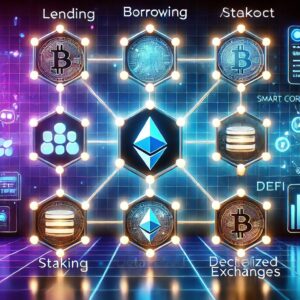DeFi, or Decentralized Finance, refers to a financial ecosystem built on blockchain technology, where traditional financial services like lending, borrowing, and trading are offered without the need for intermediaries such as banks or brokers. Instead, these services are executed through smart contracts—self-executing programs on decentralized blockchain networks like Ethereum.
Key Features of DeFi:
- Decentralization: Transactions and operations occur on a blockchain, eliminating central control.
- Permissionless: Anyone with an internet connection and a crypto wallet can participate.
- Transparency: All transactions and data are publicly accessible on the blockchain.
- Programmability: Smart contracts automate and execute predefined rules for financial services.
- Interoperability: Different DeFi platforms can often connect, creating a composable ecosystem.

How is DeFi Different from Traditional Finance?
- No Intermediaries: In DeFi, smart contracts replace traditional financial intermediaries, reducing fees and processing times.
- Global Accessibility: Anyone, anywhere, can participate, regardless of their banking status.
- Open Infrastructure: The code behind DeFi protocols is often open-source, allowing for innovation and transparency.
How to Invest in DeFi?
- Lending and Borrowing:
- Platforms like Aave and Compound allow you to lend your crypto assets to earn interest or borrow against your crypto holdings.
- Example: Deposit $1,000 worth of Ethereum into Aave, and earn annualized interest in return.
- Staking:
- Lock up tokens in DeFi protocols to support network security or operations and earn staking rewards.
- Example: Staking ETH on the Ethereum 2.0 network.
- Yield Farming:
- Provide liquidity to decentralized exchanges (DEXs) like Uniswap or PancakeSwap and earn a share of transaction fees or additional governance tokens.
- Liquidity Mining:
- Earn extra tokens by supplying liquidity to DeFi protocols as an incentive.
- Trading on DEXs:
- Use platforms like Uniswap or SushiSwap for decentralized trading of tokens.
- DeFi Index Funds:
- Invest in diversified baskets of DeFi tokens through platforms like Index Coop.
Risks of DeFi
- Smart Contract Risks:
- Bugs or vulnerabilities in smart contracts can lead to loss of funds.
- Example: Hacks on platforms like Poly Network have exposed vulnerabilities in poorly audited code.
- Market Volatility:
- The value of cryptocurrencies can fluctuate wildly, impacting your returns.
- Impermanent Loss:
- Occurs when providing liquidity to a pool, and the value of tokens changes compared to when they were deposited.
- Regulatory Risks:
- DeFi operates in a largely unregulated space, and governments may impose restrictions.
- Liquidity Risks:
- Smaller DeFi projects may have low liquidity, making it difficult to execute large transactions without significant price impact.
- User Error:
- Mistakes in wallet management, such as sending funds to the wrong address, are irreversible.
Is DeFi a Good Investment?
DeFi offers opportunities for substantial rewards but comes with significant risks. It’s ideal for those who:
- Understand blockchain technology and smart contracts.
- Can manage risk effectively and diversify investments.
- Are willing to conduct thorough research on platforms and protocols.
DeFi is a growing sector with innovation and potential, but it’s not without challenges. Approach it cautiously, start small, and learn continuously.